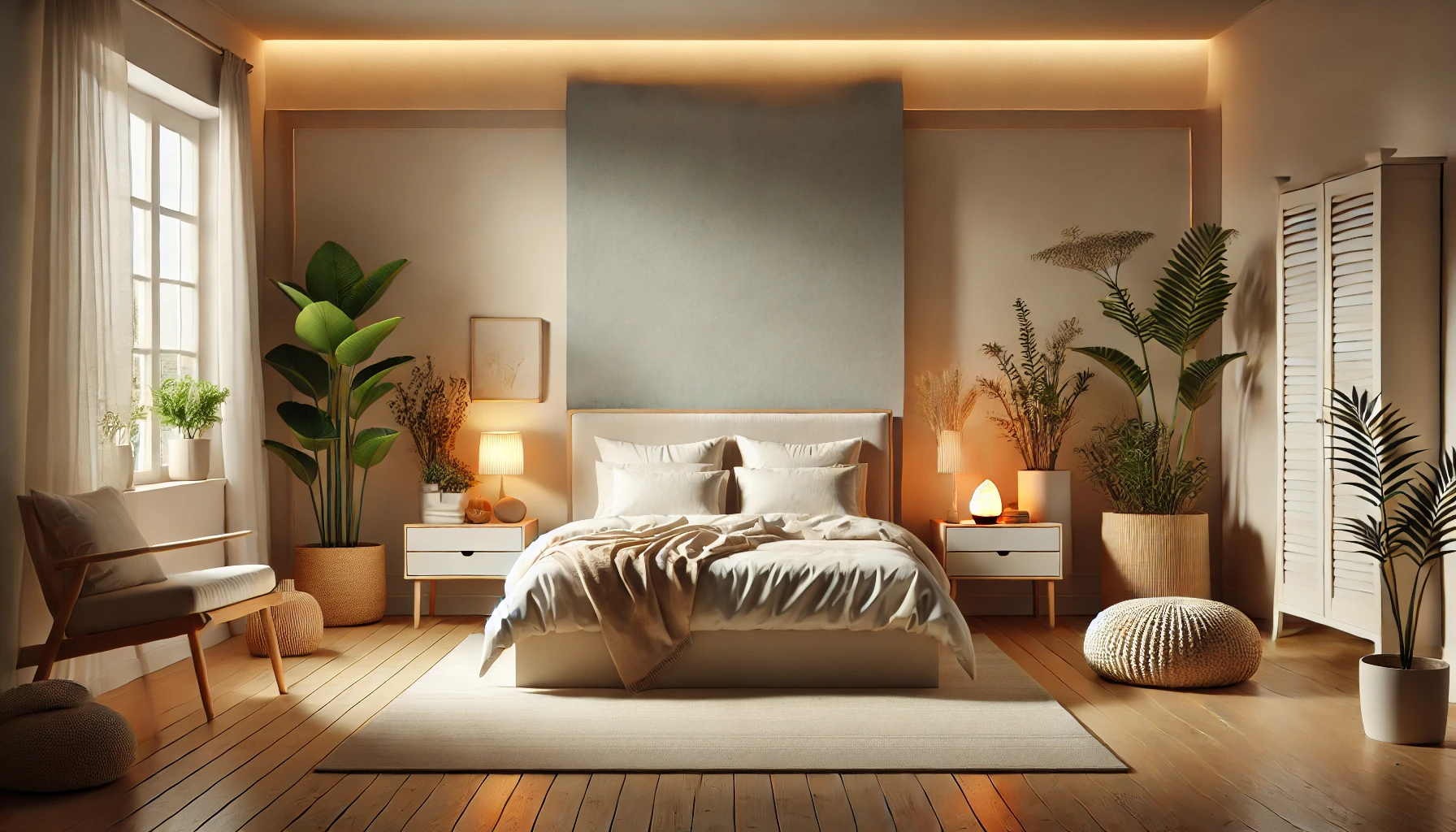How to Set Up Your Bedroom for Better Sleep with Feng Shui
A well-arranged bedroom is essential for quality sleep, relaxation, and emotional well-being. Feng Shui principles can help transform your bedroom into a peaceful retreat by improving energy flow, reducing stress, and promoting restful sleep. The way furniture is placed, the colors used, and the presence of natural elements all influence the harmony of the space.
1. Position Your Bed for Optimal Energy Flow
The bed is the most important piece of furniture in a bedroom and should be placed in a way that supports security and rest.
- Place the bed in the “command position,” meaning it should be against a solid wall and diagonally across from the door, but not directly in line with it
- Avoid placing the bed under a window, as this weakens stability and protection
- If space is limited and the bed must be aligned with the door, place a small rug or piece of furniture at the foot of the bed to slow down fast-moving energy
- Do not position the bed against a shared bathroom wall, as this can disrupt sleep
2. Choose Calming Colors for a Restful Atmosphere
Colors have a strong impact on emotions and energy levels. In Feng Shui, the best bedroom colors promote relaxation and intimacy.
- Soft blues and greens encourage tranquility and deep sleep
- Earth tones like beige, light brown, and terracotta create a warm and grounding atmosphere
- Soft pinks and peach tones enhance love and relationships
- White and light grays bring clarity and peaceful energy
Avoid overly bright or stimulating colors like red and dark black, as they can increase restlessness.
3. Remove Electronics and Distractions
Electronics create disruptive energy that interferes with relaxation and sleep quality.
- Keep televisions, computers, and work-related items out of the bedroom
- If you must have a TV, cover it at night with a cloth to minimize its energy impact
- Avoid charging phones near your bed—place them in another part of the room or switch them to airplane mode before sleeping
4. Use Soft and Natural Lighting
Lighting plays a key role in setting a relaxing mood in the bedroom.
- Use soft, warm lighting to create a calming environment
- Avoid harsh overhead lights and instead use bedside lamps with dimmable settings
- Open windows during the day to let in natural light and fresh air
5. Keep the Bedroom Clutter-Free
Clutter blocks the flow of positive energy and can lead to stress and restlessness.
- Keep nightstands clean and organized, avoiding excessive items
- Store items neatly in drawers or closets rather than leaving them scattered around
- Avoid keeping objects under the bed, as they can create hidden stressors that disrupt sleep
6. Choose the Right Bed and Mattress
A sturdy bed and a high-quality mattress contribute to a restful sleep and good energy flow.
- A solid headboard provides support and stability in Feng Shui
- Avoid metal bed frames, as they can conduct electromagnetic energy and disrupt sleep
- Choose a comfortable mattress and replace it if it starts to feel worn out
7. Incorporate Natural Elements for Balance
Bringing nature into the bedroom helps create a peaceful and grounding energy.
- Plants such as peace lilies or snake plants improve air quality and add life to the space
- Wooden furniture brings warmth and stability
- Soft fabrics like cotton or linen for bedding and curtains enhance relaxation
8. Use Feng Shui Symbols to Promote Rest and Love
Certain objects in Feng Shui help cultivate positive energy in the bedroom.
- Paired objects (two nightstands, two lamps, or two decorative pieces) symbolize balanced relationships
- A mandarin duck or rose quartz promotes love and harmony
- A Himalayan salt lamp purifies the air and creates a soft glow
9. Ensure Good Air Quality
Fresh air and good ventilation improve sleep and overall well-being.
- Open windows daily to allow air circulation
- Use essential oils like lavender or chamomile to create a soothing atmosphere
- Avoid artificial air fresheners, which can introduce unwanted chemicals
10. Position Mirrors Carefully
Mirrors should be used wisely in a bedroom to maintain good energy.
- Avoid placing mirrors directly opposite the bed, as they can disrupt sleep by reflecting energy back
- If a mirror is necessary, cover it at night with a cloth
- A well-placed mirror can help reflect natural light but should not face the bed or door
11. Remove Water Features and Heavy Bookshelves
Water elements in the bedroom can disrupt restful energy and cause financial or emotional instability.
- Avoid placing fountains, fish tanks, or water-themed decor in the bedroom
- Keep bookshelves organized, as too many books can create excessive mental activity, making it harder to relax
12. Create a Peaceful Entryway to the Bedroom
The energy entering the bedroom should be calming and welcoming.
- Keep the bedroom door clean and free from clutter
- Use a soft doormat or rug at the entrance to ground the energy
- If the bedroom is directly facing a bathroom or staircase, use a curtain or room divider to soften energy flow
Final Thoughts: Designing a Feng Shui Bedroom for Better Sleep
By following these Feng Shui principles, you can create a bedroom that supports deep relaxation, emotional balance, and restful sleep. The right placement of furniture, calming colors, natural elements, and a clutter-free environment all contribute to a space that promotes well-being.
Making small adjustments can have a significant impact on your sleep quality and overall health. A well-balanced bedroom not only enhances rest but also strengthens personal energy and relationships.
